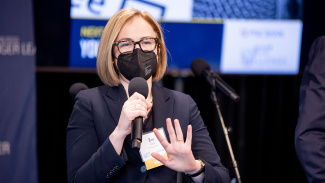What Board Members and Journalists Take Away from Students’ Experiences in the 24-hour Leadership Crisis Challenge

The Leadership Crisis Challenge tests University of Michigan students’ ability to strategize through a turbulent situation, think on their feet, and demonstrate poise under pressure.
But it’s not just the students who learn important leadership and communication skills through the program — the people volunteering behind the scenes also gain valuable insights and experience from the challenge.
Since the first competition was held by the Ross School of Business in 2007, hundreds of esteemed Michigan Ross and U-M alumni, journalists, and community members have participated in LCC, acting as demanding board members and judges. These volunteers play a crucial role in making the challenge successful by sharing their years of experience with students while providing leadership and communication coaching.
The program, developed by the Sanger Leadership Center at Michigan Ross and sponsored by PNC Bank, asks students to assume executive leadership roles at a fictitious company and navigate a crisis that quickly spirals out of control.
'Board members' take away insightful lessons
For this year’s undergraduate crisis challenge, 30 Michigan Ross and U-M alumni and community members comprised the board of directors, which staffed five “boardrooms” throughout the suites around Michigan Stadium. The crisis simulation required students to navigate through emerging issues in diversity, equity, and inclusion and technology. The fictional case featured UtuHR, a human resources HR software-as-a-service company that claimed its new product, MardukAI, uses artificial intelligence and machine learning to remove prejudice and unconscious bias from all HR processes.
First-time participant Nicole Greenblatt, BBA ’99, saw an opportunity to get involved within her community and give back to students.
“The world is changing rapidly, and we need to know how to handle unthinkable situations,” Greenblatt said. “I’m a restructuring lawyer, so my job is mostly crisis management. I’ve seen first-hand how these skills are essential to learning at this point in students' careers.”
Greenblatt, a partner in restructuring practice at Kirkland & Ellis, LLP, flew in from New York City to participate in the challenge. She said the undergraduate students who participated are getting a head start on learning the necessary skills that could one day save them in a real-life crisis.
“The undergraduate students going through these challenging situations are learning how to present a complex set of facts and information and distill it down to its core interest,” Greenblatt said. “They’re learning about effective communication, strategy, and problem-solving skills, which is core to successfully managing real issues when they graduate.”
Megan Furman, head of operations at Duo Security, was also a first-time participant, encouraged to participate by her husband, Will Thomas, assistant professor of business law at Michigan Ross, and Lindy Greer, Sanger’s faculty director and an associate professor of management and organizations at Ross.
“Lindy Greer approached me and explained how this event really challenges students, and I wanted to be involved in my community,” Furman said. “She was right — it has been a great experience to give back to my community, the university, and Ross.”
Furman is not only taking away a valuable experience of giving back to students, but she also left with new tools in her pocket from her experience in the board rooms.
While listening to other board members provide advice to students, I couldn’t help but think, ‘Oh I wish someone had told me that when I was 21.’ The board room was an example of people leading from different backgrounds, and different perspectives coming together to focus on one goal while all providing insightful ideas and solutions.
Both Greenblatt and Furman praised this year’s case focusing on emerging issues of DEI and technology because it raises important ethical questions.
“This case could happen in real life, and it could affect so many people. So exposing students to these issues is important for their learning and development,” Furman said.
Building community connections
The top three performing teams from the board presentations moved to the final round. Then, in a simulated press conference, the students faced real journalists from outlets including the Detroit Free Press and Michigan Radio.
This was the ninth LCC for Zoe Clark, an award-winning journalist and program director of Michigan Radio. She makes it a point to attend both the undergraduate and graduate challenges every year.
“I find the interaction between the students and the journalists during the press conference to be fascinating because they have no prior experience, and they’re thrown into a situation where they have to come up with a professional response in a small window of time,” Clark said. “I’m blown away by these students every year because you get to see their authentic selves perform under stress.”
After the final press conferences wrap up and while the judges deliberate on the winning team, the audience can turn to the journalists and ask them questions about their roles in the media, which is Clark's favorite part of the challenge because it is a chance for community building.
“There aren’t many news reporters floating around anymore that are part of a community, and that’s where trust-building in journalism happens,” Clark said. “Now, it’s mostly just people behind a screen. Many people don’t know who they can trust anymore, so building this level of connection in a community with this new generation is very important to me.”
Learn how you can get involved in the next Leadership Crisis Challenge







